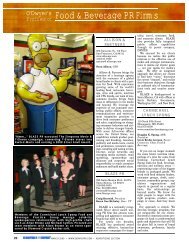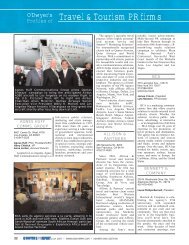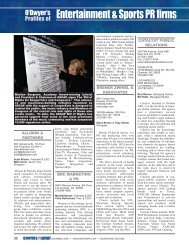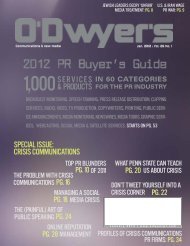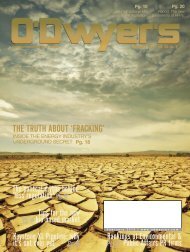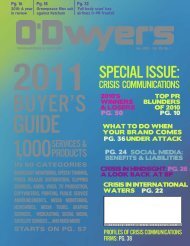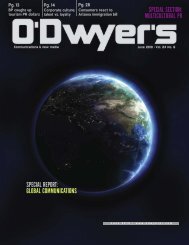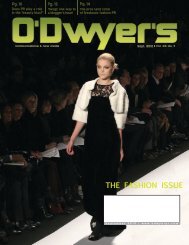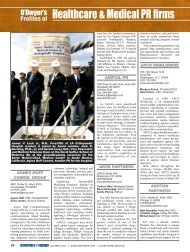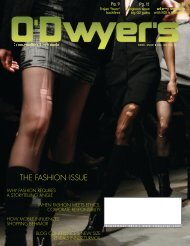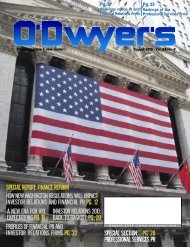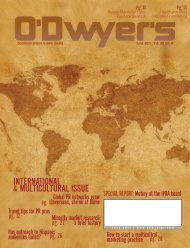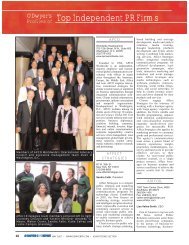PR Firm Rankings - Odwyerpr.com
PR Firm Rankings - Odwyerpr.com
PR Firm Rankings - Odwyerpr.com
Create successful ePaper yourself
Turn your PDF publications into a flip-book with our unique Google optimized e-Paper software.
REPORT<br />
Study finds many ‘hooked’ on social media<br />
By Jon Gingerich<br />
Students who abstained from social<br />
media and cell phones reported<br />
experiencing “withdrawal” symptoms,<br />
according to a recent study conducted<br />
by the University of Maryland.<br />
A class of 200 UM journalism students<br />
took part in the study, which was administered<br />
in the form of an “assignment” that<br />
stipulated students spent a 24-hour period<br />
free of all media — no iPhones, iPods, laptops,<br />
televisions or radio. Students got to<br />
choose which day they would spend<br />
media-free, and were then asked to write<br />
about their experiences, their successes and<br />
failures.<br />
Students participating in the experiment<br />
reported a number of withdrawal symptoms<br />
not unlike those suffering from chemical<br />
addictions, listing specifics like anxiety<br />
and “fidgeting.”<br />
One student concluded having the realization<br />
of feeling “incredibly addicted”<br />
after the experiment.<br />
“Although I started the day feeling good,<br />
I noticed my mood started to change<br />
around noon. I started to feel isolated and<br />
lonely,” wrote one student. “By 2:00 p.m.<br />
I began to feel the urgent need to check my<br />
email … I felt like a person on a deserted<br />
island …. as if I was addicted to my iPod<br />
and other media devices.”<br />
While students reported abstaining from<br />
mediums like TV or newspapers with relative<br />
ease, they found that be<strong>com</strong>ing technological<br />
teetotalers from devices like<br />
BlackBerries or iPhones was noticeably<br />
more difficult.<br />
“I clearly am addicted and the dependency<br />
is sickening,” said another student. “I<br />
feel like most people these days are in a<br />
similar situation, for between having a<br />
BlackBerry, a laptop, a television, and an<br />
iPod, people have be<strong>com</strong>e unable to shed<br />
their media skin.”<br />
Susan Moeller, Professor of Media and<br />
International Affairs and Director of the<br />
International Center for Media and the<br />
Public Agenda, said she was surprised at<br />
the level of distress and “extreme difficulty”<br />
many students reported while on the<br />
media wagon.<br />
Moeller said the study was also telling of<br />
how we parse our social interactions<br />
around technology: students who typically<br />
walk around campus with ear buds, for<br />
instance, found themselves forced to speak<br />
with others. Students who prefer texting<br />
friends now found they had to reconfigure<br />
the customs surrounding how they <strong>com</strong>municate.<br />
“We didn’t ask students to go live in a<br />
tent for 24 hours. People reported feeling<br />
lonely, sad or depressed but they weren’t<br />
reporting any fewer social contacts, just different<br />
kinds of social contacts,” she said. “It<br />
became clear that students were forced to<br />
address the different ways they interact with<br />
people face-to-face versus text messaging,<br />
and they found the results distressing.”<br />
One particular student admitted that:<br />
“texting and IM-ing my friends gives me a<br />
constant feeling of <strong>com</strong>fort. When I did not<br />
have those two luxuries, I felt quite alone<br />
and secluded from my life.”<br />
Moeller said perhaps the most interesting<br />
aspect of the study was that students<br />
remained up-to-date on current events even<br />
as they were disconnected from media<br />
sources.<br />
She found the students to be generally<br />
news-savvy, though perhaps less reflective<br />
about their media consumption habits.<br />
Moeller said students are able to discuss<br />
current events but typically don’t retain the<br />
source or network branding from where the<br />
news originated, a virally-influenced consumption<br />
habit she described as “disaggregated.”<br />
“They’re following news but they’re following<br />
it in a different way,” she said.<br />
“When you ask students how they heard<br />
about the Chilean earthquake, they don’t<br />
talk about going to TV or the Internet, but<br />
maybe a blog that might have picked it up<br />
from the New York Times, or even a conversation.<br />
They don’t track the links back, and<br />
they’re seemingly just as happy to take<br />
information that came from a personal<br />
passing on as from the news.” <br />
Media Briefs<br />
Rolling Stone adds paywall<br />
Rolling Stone has re-launched its website<br />
and be<strong>com</strong>e one of the first major magazines<br />
to put most content behind a subscription<br />
paywall.<br />
A pay structure set up offers a $29.99<br />
yearly subscription bundled with the magazine<br />
or $3.95/month for online users to<br />
view editorial content and multimedia from<br />
current and past issues dating back into its<br />
43-year archive.<br />
Free access remains in place for breaking<br />
news and some photo content.<br />
Rolling Stone’s magazine circulation is<br />
about 1.5M and its website attracts about<br />
1.3M million unique visitors.<br />
10 MAY 2010 WWW.ODWYER<strong>PR</strong>.COM



